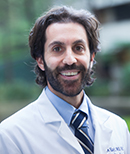Interview with Arian Hatefi
A Conversation with Arian Hatefi, Assistant Clinical Professor
Where were you born and raised?
 I was born in New Jersey, in Bergen County.
I was born in New Jersey, in Bergen County.
What does a thinking man think about?
I think it depends upon when you catch me. Professionally, I think about Global Health, specifically meaning health worldwide, how to make it better. The other is being compassionate and humane, how do we get better, knowing that we're not perfect. Another part of me thinks about the arts, I am always hooked by story, be it in music, story, filmmaking or painting. I never took the time to dive into prose narrative but, believe it or not, I did write a screenplay once that did get some attention in festivals but I never pursued it afterward. I am still very interested in film and actually worked at the Cannes Film Festival one summer in my early twenties and it was amazing. I joined an organization called the American Pavilion that set up an international business center for Americans to foster relationships, conduct business in the film industry during the festival. It was an awesome experience just to be there, very international and glamorous, especially in the 2000-seat Lumiere Theatre. I remember stepping out in my tuxedo to the sound of a giant Darth Vader statue breathing because it was the world premiere of the third episode of the Star Wars trilogy—it was phenomenal! I also think about my family and my 11-month-old son. I've always been an athlete. I love sports, playing sports and watching sports. I have a few hobbies. I love gardening and have been dabbling with photography, trying to get good at it.
Are you a serious or funny guy? Does one side reveal itself more than the other, and when?
I am a mix of both overall. I love, love Seinfeld and Curb Your Enthusiasm. Larry David really speaks to me because there is a seriousness and a silliness to the comedy that he and Jerry Seinfeld bring because there is an irritated component: "I wish the world were different somehow" but it's also, "I'm not going to just let it go, I'm going to show the mania of it." There is a pull towards the ludicrous; an appreciation of calling out of truths that don't make any sense yet there they are.
What distraction do you always welcome?
Sports are a release for when things are very serious, sad, or stressful. Basketball used to be, but now I just don't have the easy access of walking out and shooting hoops.
What books or films have you seen that you highly recommend?
I recently decided that I was going to read James Joyce's four major novels but I've so far only completed The Dubliners. The American Film Institute has a list of the top 100 American films and I decided that I was going to watch all of them in order, one of the best things that I've done. It is functionally from the earliest films made like Intolerance, which dates around 1910, and The General. Films that I love are Raging Bull, Chinatown, A Streetcar Named Desire and, my all time favorite, Casablanca.
Do you have a personal code of conduct by which you live? Is it written and do you find occasional need to amend it?
My code of conduct is essentially to respect all life and to practice nonviolence in everything that I do. Not only physical violence but also verbal violence, to always speak respectfully. Those are hard and fast principles that should never be amended. The only caveat, of course, is that I am not perfect and these are ideals to which I aspire.
How do you enjoy your vacation time away? What is your ideal type of destination?
My perfect vacation combines both activity and leisure. I like both. I am a warm weather guy, although I don't mind cold weather, I grew up in it. I try to head for the Equator or as close as possible. I love the beach, the ocean and warmth.
In your first year as faculty, what has been the biggest revelation?
The first thing I thought was that now I've grown up, I felt this new call to be mindful of being a role model. It really requires deliberation, being conscientious and recognizing that it's human to step out of that role-model space every now and then but making it the ideal to aspire to. That’s been a new challenge but one that I love, it's great. Previously I was connected in my Global Health activities to the Global Health Sciences people, not the hospitalists, and they are usually not seeing patients or giving care. Since being in the division, we're just collaborating so much more and getting a lot of momentum, and that's been really exciting. There is opportunity to maybe bridge a divide between the two groups. And, there are so many teaching and clinical opportunities and scholarly activities that I've taken on so much that I am finding that saying no is an important piece. It's not that people are soliciting my energy but I want to get involved and have to tell myself no, that I may not have the bandwidth. It becomes an issue of prioritization and that's particularly been hard when, in my case, the different activities don't necessarily overlap. I am not complaining, it's a good problem to have!
What will you be doing on Super Bowl Sunday?
I will probably watch the game but we don't have any plans. For us it will be just like any regular Sunday.
Thank you for sharing, Arian.
- by Oralia Schatzman
View Arian's professional bio | See previous faculty interviews
